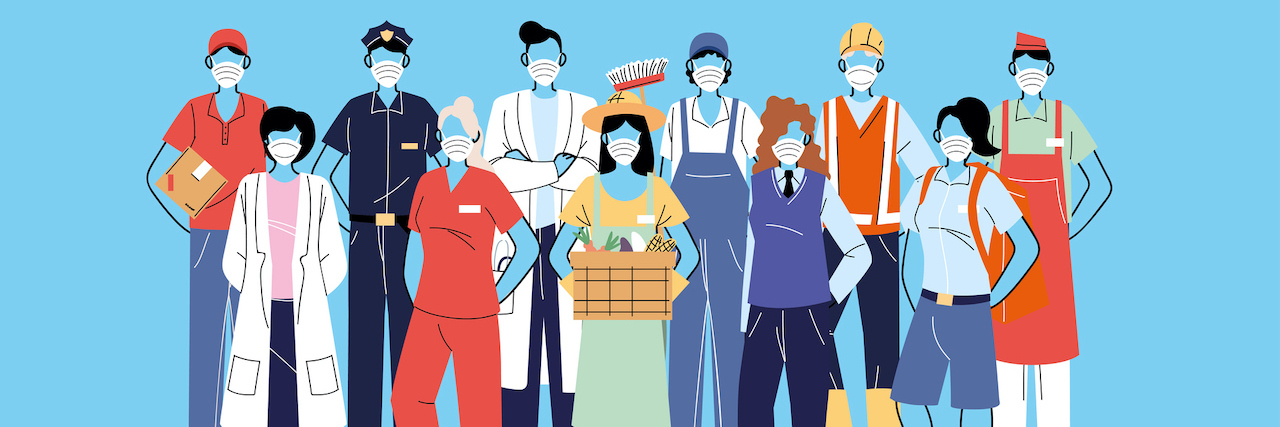My Perspective on Supporting Frontline Workers as Someone With Chronic Illness
What a bizarre, unlikely world we have stumbled into.
Not by choice.
Not by accident.
By now, the novel coronavirus (COVID-19) outbreak will be remembered as “a shift in the course of our shared history.” This shift does not, however, need to be remembered as a solely negative concept, but one where we had to get back to basics and had to rely on a different kind of communication to remain in contact with our loved ones. We went back to the key question at the core of people’s moral compass: identifying who and what is important in life.
As suggested in the past, I owe an immense debt of gratitude to those working on the frontlines, be that nurses, therapists, doctors, their administrators, those working in different patient organizations, etc. As a community, we owe our safety, feeling of independence and health to the best of the best, e.g. your local police force, firefighters, social workers or volunteers delivering meals on wheels, hospital porters, housekeepers…
Both lists are endless.
Despite their invaluable need in any community, some are looking in from the outside and suggest, “Oh, I’m sure they’re entirely in it for the money.”
I hold frontline staff to a much higher standard.
One cold, wet Monday morning in February over a decade ago, I stepped into the accidents and eergency department in my local hospital in Ireland and walked out 10 days later with “a high probability of multiple sclerosis (MS)” and trigeminal neuralgia diagnosis.
Four days into the hospitalization and after a battery of medical tests, the consultant looking after me walked up to me and said, “I need to apologize to you. I thought you were just another Monday morning case who didn’t feel like going to work, but from your MRI scans, you seem to have a particularly high probability of MS, so we need you to stay in the hospital for a lumbar puncture and more tests.”
The apology came as unexpectedly as the diagnosis. Until the arrival of the MRI results which indicated the “high probability of MS,” nothing in his behavior suggested he could have been dealing with someone who was in the process of inventing symptoms that weren’t there “just because you wanted to skip work that day.” His professionalism and sheer honesty took me by surprise and it set the tone to what eventually would become a deep understanding of what medical professionals contend with on a daily basis.
After living with a doctor, being involved in student-doctor and residents’ exams, and having spent so much time in hospital surroundings for my MS and other ailments, I’ve seen how they are impacted by first trying to resolve medical issues. But I’ve also seen how they needed to place their personal thoughts either in a professional and private framework, whether someone is faking an illness or not, or when they have to deliver a tried and tested diagnosis that will come as a shock to anyone. I presume the diagnosis came as much as a surprise to him as it did to me, and he took me under his wing from that moment onwards.
Worth it
Much of the central nervous system is still uncharted territory, which is reason enough to make neurology a fascinating specialization. It is therefore during student-doctor or resident exams when sitting on a hospital table as a physical test subject, I am in awe of their vast amount of insight and knowledge. It is a joy seeing them fit a hospital-acquired superbug, trigeminal neuralgia, and other sensory and cognitive symptoms into the jigsaw that make up my multiple sclerosis, whacky immune system and eye trouble. And that’s without their ability, to sum up, a list of medicines that quite resembles mine.
This is not a job for the forgetful, faint-hearted and daily partygoers.
Since the start of the coronavirus outbreak, the many videos and interviews we’ve seen on TV to thank those on the frontlines who care for severely sick patients, make me want to join in, so I gladly open the front door or windows to clap my hands, or light candles on pavements and on windowsills to show that we get it. The outpouring of support healthcare workers and other frontline people receive moves me to tears.
Tears of gratitude.
I certainly get it.
If you’re still not convinced, I want you to stand beside me and look through my eyes.
We might see doctors for a mere 10 minutes when doing their rounds, but nurses and other therapists are continually buzzing around to take care of patient after patient.
Add a deadly possibly airborne and easily transmittable illness like COVID-19, and imagine that doctors and nurses are risking their lives simply because the basic or full personal, protective equipment (PPE) they’re required to wear, has to be worn for a half a day or longer. Because their government is about to break under immense strain because they need to completely reorganize their country and have no idea where to purchase the next batch of personal protective equipment. And that is before the next person with the coronavirus is brought into the hospital.
Yet they keep on working, with PPE that has only been changed three times in a 29-hour shift. In addition, doctors, nurses, hospital cleaners, porters, and anyone making sure patients are tended to properly, end up working through fatigue, hunger and fear of catching COVID-19 because of the lack of new PPE. It is only fair to say there needs to be a larger political will to care for those on the frontlines of what can easily be called biological warfare of some sort. Not doing so is a disgrace.
This is not the theory of relativity, but a theory of morality: by protecting yourself you are saving others.
We owe nurses, physicians, lab technicians, EMTs and other frontline employees the respect and dignity they deserve by wearing your own face masks when you need to venture out. By stopping others from being sprawled by our own airborne virus particles, medical professionals can continue doing their job without being diagnosed by the coronavirus themselves.
We also owe them our recognition for showing up to work, day after day after 24 plus hour shifts, knowing they sacrifice spending time with their children and partners to take care of people they do not know and might never meet again.
Imagine the mental and emotional toll it takes on healthcare workers who not only have to do the physical nursing, but added to this might be the only one present when one of their patients passes away, holding their hands so they wouldn’t have to do so alone. Not just once, but several times during their shift.
We might owe them our own lives, perhaps even yours or mine on Friday or Saturday, or sometime next week because we forgot to maintain a six-foot distance from each other when restrictions were eased.
Many are laughing and spitting in the face of frontline staff. How dare you take their courage, commitment or responsibility for granted when you decided on the above out of lack of understanding, pure idiocy or ignorance (and by gob, what were you thinking leaving the house to protest lockdown rules because you felt bored sitting at home?)
You can be awfully sure we owe frontline staff
If you’re not willing to be part of the solution, then do not cry wolf when the coronavirus shows you why staying at home and social distancing are the only recommended ways to flatten the curve.
If you just lost your job or are on the brink of being unemployed, I understand you’re living with abnormal stress levels. I truly do understand. The issue is, people need a job, but there won’t be one if or when people do not heed scientific and medical intelligence on COVID-19. There won’t be a job if people think that protesting against the-stay-at-home rules will sway virologists, immunologists and other medical experts.
Don’t forget, they have science on their side. You don’t. It’s not rocket science: if you want to have a good life, you will want me to wear a face mask and stick to the rules set out by those who are the best in their field in immunology and virology, so I want you to do the same for me so I can have a life as well, preferably one where I don’t have to wear a coffin around my neck because you forgot to wear your face mask.
That is why we need to have the moral insight not to go selfishly about our day and think we can do as “back to where we were before COVID-19.” Like I wrote in my previous post on April 13th:
And, going back?
Going back to when we didn’t know about the coronavirus? The pandemic has already proven it is a turning point for social and economic governing bodies, globalization, liberalism, and even the environment and cultural habits have changed.
Hence, my sincerest apologies but you cannot go back.
‘Back’ is where it all went wrong.
‘Back’ is the big why, what or how.
The big ‘if’ or ‘when’.
The answer to the above ‘big’ questions?
Science.
Instead, open your mind, doors and windows and clap your hands, stomp your feet, sing or light up your street with candles on the pavement. Leave frontline workers hidden thank you notes or secretly pay for someone’s dinner because they might not have the energy or can’t afford to cook a meal for their children. Do whatever is in your heart to show them how invaluable they are. In the end, this is not about you; it is about everyone around you.
So, act like it.
Getty image by djvstock


